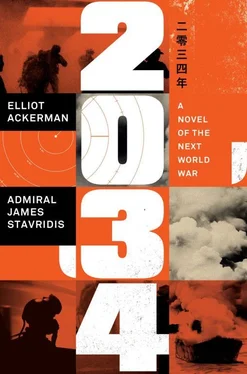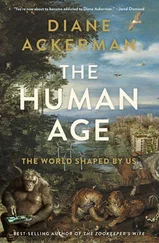Farshad understood. Certain national identities were defined by certain national antipathies. What was more Persian than hating an Israeli? More American than hating a Russian? Even if Patel wouldn’t divulge what “decisive action” his country was planning to take, Farshad understood that like a pack of distracted children swarming a soccer ball, a crisis with the Pakistanis might prevent the politicians in New Delhi from acting strategically. What Farshad didn’t understand was how he and his country were in a position to forestall Pakistani aggression.
“The Pakistanis won’t move without Beijing’s approval,” Patel stated flatly. “You’ve got the ear of the Chinese. Convince them to keep their Pakistani allies on a leash. That shouldn’t be too difficult, should it?”
“And the Russians?” asked Farshad.
Patel gathered their two empty cups of tea and disappeared into the kitchen. When he returned, he was carrying a thick manila folder. “Our intelligence services have intercepted their plans,” he said. “It’s all here.” Patel handed over the folder, which detailed how a Russian Spetsnaz division, supported by a carrier battle group, would seize the two lightly defended Iranian islands in the strait. The entire operation would take a single day. Farshad skimmed the documents with a growing sense of alarm. There wasn’t much time to avert this disaster, a week at best.
The doorbell rang. It was the taxicab.
“The driver will take you to the airport,” said Patel.
“The airport?”
“I imagine you want to get back to Tehran, to speak with General Bagheri. We’ve booked a flight for you. Pass along my regards. Tell him that we’re happily anticipating news that our freighter has been released and that we’re very much looking forward to our partnership.”
Outside the window, the driver stood by his taxi.
“What is this ‘decisive action’ you keep referring to?” Farshad asked. “General Bagheri is going to want to know.” Farshad remained on the sofa, cemented in place as if his returning to Tehran might be contingent on this last piece of information.
Patel gave Farshad a long, appraising look. “What we’re going to do next will be dramatic,” he answered. “But it will end this war. Will you trust me?” Patel placed his hand on Farshad’s arm.

12:07 July 20, 2034 (GMT+5:30)
New Delhi
Over and over again, Chowdhury kept calling her. Sitting in the back of the taxicab on the way to the embassy, he was in a panic. Samantha wouldn’t answer her phone. He kept dialing and dialing.
Nothing.
His former mother-in-law, that Texan WASP Chowdhury had never felt any affinity for, lived in Galveston, her health failing, her only enjoyment the ocean air and those periodic visits from her daughter.
As he crossed from the east to the west bank of the Yamuna River, Chowdhury tapped out an email to Samantha: Have tried you many times. Please call -Sandy
A new email popped into Chowdhury’s in-box, an out-of-office reply from Samantha. I will be away from my desk and in Galveston on a family matter until Monday, July 24th. If the issue is urgent, please try my cell phone.
Like that, she was gone.
The grief Chowdhury felt wasn’t for the loss of her; the two hardly had a relationship. It was for his daughter— their daughter. How many times over the years had he secretly hoped that Samantha, his stalwart antagonist, might vanish in such a way? Lost in a plane crash. Incinerated in a fire. Killed in a car wreck. He had, guiltily, harbored such fantasies. However, had any of these fantasies proven true, it would’ve left Ashni motherless. And now that Samantha was gone, his guilt was as acute as if he’d killed her himself. In fact, he couldn’t quite convince himself that he hadn’t.
When he arrived at the embassy, it was eerily quiet. He had expected to find a hive of activity as the ambassador responded to this crisis. Instead, the halls were mostly empty. Here and there, clusters of staff gathered around one cubicle or another. From the hushed tones of conversations, Chowdhury assumed the cubicles’ occupants had lost a loved one in the attack. Otherwise, the mood was stunned silence.
Chowdhury shut the door to the temporary office he’d been assigned. Though he didn’t wish to admit it, he, too, was stunned. As he logged into his email, he hoped to find something that might recall him to his senses. At the top of his in-box there was a message from Hendrickson. The subject line was empty, and even though they were communicating on a classified system, the text was cryptic: Our orders arrived. What do you hear? -Bunt
Chowdhury knew those orders were for a counterstrike led by the Enterprise . It would be against the Chinese mainland. The days of indirect strikes—at power grids, or disputed territories like Taiwan—were over. The counterstrike would follow this pattern of escalation. Zhanjiang had led to San Diego and Galveston, so the next logical step after the destruction of two American cities would be the destruction of three Chinese ones. The only question was which cities, a detail that Hendrickson had no doubt received in the recently arrived “orders.”
While Chowdhury sat in front of his screen struggling to compose a response, his cell phone rang.
It was his uncle. “Our Iranian friend just left.”
“To where?”
“Home,” said Patel. “Are you at the embassy?”
Chowdhury told him that he was.
“Nothing’s going to get accomplished there,” said his uncle. “I’m on my way to the Defense Ministry. Come meet me.”
Chowdhury made a half-hearted protest; he wasn’t in New Delhi on an official diplomatic mission and a meeting at the Defense Ministry broke any number of protocols; he would first need to secure the appropriate authorizations. His uncle listened, or at least the other end of the line fell silent, before he said, “Sandeep, we know the Enterprise has its launch orders… and I know about Ashni’s mother. For that, I am sorry; we can tell her together if you like. But first, we need you to come to the Defense Ministry.”
Chowdhury glanced out his window, to the vacant corridors of the embassy. He knew his uncle was right. Nothing was going to happen here, or at least nothing that might avert a counterstrike by the Enterprise . We’ll take out three of their cities for our two. Then what? They’ll take out four of ours. Then we take out five more. Then come the doomsday weapons…. He could feel his loyalties shifting, not from one nation to another, but between those who wanted to avert an escalation and those who believed that victory, whatever that meant, could exist along this spectrum of destruction. Receiving the appropriate authorizations to visit the Defense Ministry suddenly seemed like an irrelevance. He increasingly felt as though his allegiance didn’t reside with any government but with whoever could reverse this cycle of annihilation.
“All right,” said Chowdhury, returning to his desk. “I’ll be there in thirty minutes.”
His uncle hung up.
Chowdhury couldn’t help but wonder how the Indians knew that the Enterprise had received their launch orders. It could have been a myriad of intercepts made by their intelligence services, but Chowdhury suspected they’d intercepted his correspondence with Hendrickson. If they had, their ability to hack into his classified email demonstrated a level of cyber sophistication beyond what he and his country had previously thought them capable. When Chowdhury crafted his reply to Hendrickson, he now did so with the knowledge that others might be reading it. In response to the question What do you hear? he wrote: The Indians might do something.
Читать дальше













